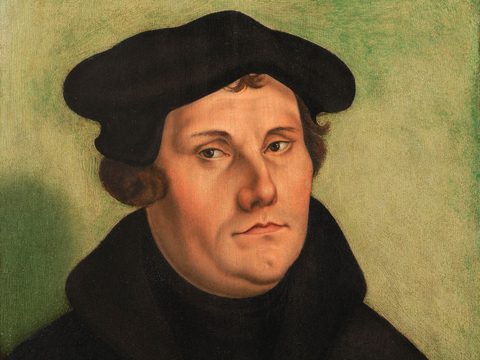 Today (2/28/18), I attended two lectures on “Luther and the Legacy of Anti-Semitism” held at the Arizona State University in Tempe, Arizona, which is ASU’s main campus. It was sponsored by two ASU organizations: the Center for the Study of Religion and Conflict and the Center f0r Jewish Studies. The two speakers were Gary McCluskey, pastor of the local University Lutheran Church and director of its Campus Ministry at ASU, and Volker Benkert, ASU professor of the School of Historical, Philosophical and Religious Studies. The University Lutheran Church is a member of the Lutheran Church of America, which is the largest Lutheran denomination in the world.
Today (2/28/18), I attended two lectures on “Luther and the Legacy of Anti-Semitism” held at the Arizona State University in Tempe, Arizona, which is ASU’s main campus. It was sponsored by two ASU organizations: the Center for the Study of Religion and Conflict and the Center f0r Jewish Studies. The two speakers were Gary McCluskey, pastor of the local University Lutheran Church and director of its Campus Ministry at ASU, and Volker Benkert, ASU professor of the School of Historical, Philosophical and Religious Studies. The University Lutheran Church is a member of the Lutheran Church of America, which is the largest Lutheran denomination in the world.
Gary McCluskey spoke first for 30 minutes. He provided a slew of facts as follows:
Martin Luther was born in Germany in 1483 and died in 1546. He entered a monastery in 1505. He became a professor mostly of Old Testament in a small college town of Wittenberg, Germany. He nailed his famed “95 Theses” to the Wittenberg Church door in 1917. Modern scholars largely denied he actually nailed it there, but some recent scholars affirm it. This was an unexpected moment that started the Protestant Reformation. Luther only wanted to challenge others to debate him mostly regarding the abusive Roman Catholic practice of indulgences, as this brief document says often.
What was Martin Luther like? He had poor health, being troubled by kidney stones and two heart attacks. He was “idealistic, optimistic, bombastic, and vitriolic.” Early in his career, Luther was especially incensed against Anabaptists, the forerunners of modern Baptists. Also early in his career, Luther was obsessed with sparking the conversion of Jews to Christianity. This was strange since there were no Jews in Wittenberg, and Luther never had much contact with Jews even though Germany had many.
Martin Luther had a strong belief that the world was going to end soon, in which Jesus literally would return. [McCluskey did not says this: I think Luther also believed it would be preceded by a conversion of Jews to Christianity. Many Christians have thought this is indicated in Luther’s favorite Bible book, the book of Romans, in Romans 11.25-27.]
Anti-Semitism was quite pervasive in Germany both before and during Luther’s life. So, he was affected by his culture in this. By 1530, Luther changed when he became frustrated with Jews for not becoming Christians. For the next and last sixteen years of Luther’s life, he became increasingly anti-Semitic.
Europe had many restrictions against Jews. These were imposed upon them especially by the Roman Catholic Church (RCC). Many Jews worked in banking, and they charged interest on loans. Hitherto, Christians had regarded that as usery and thus a sin. One reason Jews gravitated to banking is that European governments forbade them to work in manufacturing or real estate. In fact, European states restricted the Jews’ clothing, with some requiring that they wear yellow to identify themselves as Jews. By the 13th century, Vienna became the first place that required Jews to live in ghettos. The RCC had a Constitution for Jews to suppress them.
Luther believed the typical European rumors about Jews, that they poisoned water wells and sacrificed children to use their blood in rituals. Luther also accepted the RCC’s designation of Jews as “Christ-killers,” blaming only them for the death of Jesus.
Not long after the Protestant Reformation began, Luther’s Church condemned and excommunicated him. For several years, Luther’s life was in danger. Pope Leo X demanded that Luther cease his writings. Martin refused and eventually translated the entire Bible into German, which was a first. He also was the first German professor to learn Hebrew sufficiently in order to translate the Old Testament.
Luther’s first mention of Jews in his writings is in his commentary on the Psalms, published in 1515. He struggled with the book of Romans saying God still has a covenant with Jews even though they reject Jesus as Israel’s Messiah. In 1523, Luther wrote and published a pamphlet entitled “Jesus Christ was born a Jew,” citing only Old Testament texts which was also a first. In it, he said Christians need to treat Jews fairly as neighbors. But by 1538, Luther had become so hardened against Jews that he wrote and published “Against the Sabbatarians.” These were Christians who worshiped on the Jewish Sabbath–Saturday. In this document, Luther blamed Jews for this.
But the most damning writing against Martin Luther for his growing anti-Semitic vitriolic was his 1543 publication “On the Jews and Their Lies.” In it, he exhorts people to literally burn Jews’ houses, burn synagogues, and for the German government to expel all Jews. But it should be known that Luther was responding in this booklet to a Jewish document published recently in Germany which claimed that Jesus’ mother, Mary, was a prostitute, that Jesus never did miracles, and that he did not literally arise from the dead, which latter has always been a main tenant of Christian doctrine.
Most German princes ignored Martin Luther and his malice, especially that against Jews. Yet Luther had become one of the most famous people in Germany. Orthodox Lutherans unashamedly came to like Luther’s anti-Semitism.
Pastor McCluskey concluded his lecture with these two poignant remarks: “You can explain Luther, but not defend him. We Lutherans have to admit his faults and take responsibility for Martin Luther.”
Volker Benkert then spoke, also for about 30 minutes. Volker is Roman Catholic. He said, “Martin Luther is a national icon” for Germany. Volker made these remarks:
With Luther’s German translation of the Bible, he created a German language that helped unify Germans. The Hollywood movie entitled “Luther” that was released in 2003 presents an apologetic view of Martin Luther which omits his anti-Semitism. (It was produced by Protestant churches.) Many Lutherans make a distinction about Luther’s career with the year 1530 as critical, when his anti-Semitism first emerged. These Lutherans therefore identify “Luther 1,” whom they like, and “Luther 2,” whom they don’t like. Some of these Lutherans would have preferred that Martin had died in 1530. Luther viewed Turks, Muslims, and Jews as less than equal to other humans.
How does Martin Luther relate to Germany’s Nazi Party and the Holocaust? The Nazis cited some of Luther’s anti-Semitic remarks from his writings. Yet the anti-Semitism of Martin Luther and that of the Nazi Party were different. Luther’s anti-Semitism was only religious; the Nazis’ anti-Semitism was racial.
The Protestant Church split in Germany during the Nazi era. Bonhoeffer led the split from Orthodox Lutherans, which was called “the Confessing Church” of Lutherans. Orthodox Lutherans cited Martin Luther’s anti-Semitism in calling for a “cleansing” of Jews from Germany, which led to the Nazi’s extermination of them in the Holocaust.
Professor Benkert concluded his lecture by saying that after WWII, “German Lutherans have had to grapple with Martin’s Luther’s anti-Semitic legacy.”
A Question and Answer period then ensued. I thought all of the questions asked were quite good and that it shows that the audience of about 100 people were fairly educated and somewhat elderly. The Q&A went as follows:
Question: What did Bonhoeffer think of Luther’s theology? Benkert said Bonhoeffer respected Luther’s strong belief in “individual conscience.” McCluskey said Bonhoeffer lived in New York City and felt called [by God] to return to Germany to affect positive change there. Benkert added that Luther’s primary importance [in history] was his highlighting the need for reform in the RCC.
Question: How did Orthodox Lutherans reconcile their support of Nazi anti-Semitism with the teachings of Jesus? Benkert said they wrongly perceived Jews as dangerous, powerful people who represented an attack on Germany. In reality, German Jews were a somewhat small group.
Question: Why did Luther care about Jews? McCluskey said there were no Jews in Wittenberg. Yet Luther accepted the anti-Semitic culture of Germany. He was paranoid about it. Luther would have profited from more exposure to Jews. [How about this for application to ourselves.] McCluskey at some point said Luther disliked the term “Lutheran.”
Question: How do Jews regard Luther? The moderator spoke, saying, Luther expected mass conversion of Jews. His disappointment on this led to his anti-Semitism.
Question: How did the Catholic Church respond to the Nazis’ anti-Semitism? McCluskey said, except for some Catholic individuals, it failed to protect Jews or oppose Nazis about it.
Question by a Jew who born in Germany in 1933 and emigrated to the U.S. in 1939: Why doesn’t the church speak out today against hatred toward Jews and Muslims? McCluskey said the media doesn’t report Christian opposition to anti-Semitism and that of the Nazis. Church pastors don’t say much about it, which may be partly due to financial pressure–there would be less monetary donations to the church.
The moderator concluded the event by saying, “Anti-Semitism is still very alive.” Benkert added, “especially by Muslims.”
See my following additional posts about Martin Luther since last fall was the 500th anniversary of the Protestant Reformation, which he started:
“500 Years Since Martin Luther Hatched His Protestant Plot with ’95 Theses’”
“Indulgences and Purgatory in Martin Luther’s 95 Thesis”
“The Many Faces of Martin Luther”












